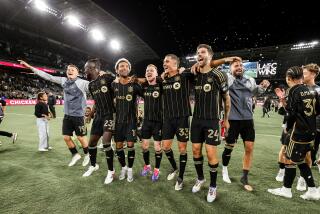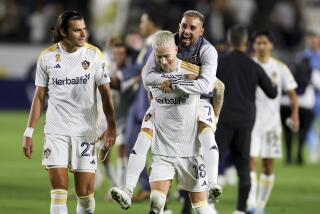Conflicting Matches Not a Problem
Soccer promoter Eduardo Aguirre was sitting in the Coliseum press box, talking about the future of the game in the United States. This path of discussion, naturally, led to Major League Soccer and the Anschutz Entertainment Group.
“The only way the club teams are going to grow is if they change the structure of the MLS,” Aguirre said. “Where’s the competition? You have the Anschutz Group that owns 60% of the teams. How can you create competition?”
Well, there was competition Wednesday night.
There were three soccer matches of significance played within 15 miles of one another, jammed into the window of about 4 1/2 hours.
Two were games of the Hexagonal Rumbo, a qualifier for La Copa Libertadores event, and the other was the Galaxy’s opener of a first-round MLS playoff series.
At the Coliseum, Morelia defeated Cruz Azul, 1-0, on a goal by striker Jose Antonio Noriega in the 90th minute.
In the second match of the doubleheader, Toluca defeated Pachuca, 2-0, taking a 1-0 halftime lead on Sergio Ponce’s goal in the 28th minute.
Pachuca, in fact, had a conflict Wednesday, fielding its B squad. The first team of Pachuca lost to Club America, 3-0, in a Mexican League match at Mexico City.
At the same time the Galaxy opened the playoffs by defeating the Kansas City Wizards, 3-2, at the Rose Bowl. As for the other key result: Galaxy attendance--14,585. Coliseum attendance--7,236.
Officials from both venues downplayed having conflicting matches. Promoters of the pre-Libertadores event sought permission months ago for these dates at the Coliseum, long before the Galaxy secured home-field advantage for the playoffs.
The Galaxy felt that attendance would not be impacted because the team does not have a Mexican player on the squad.
“But it’s unfortunate to have fans divided that way because we should be able to help each other,” said Rigo Cervantez, the Galaxy’s manager of Hispanic public relations.
“Soccer needs all the help in the world. But I truly believe our most loyal fans, the Central American fans and the Anglo fans, will be here, as Mexican fans will be at the Coliseum. So they will have their fans and we will have our fans.”
Aguirre, the president of the rights holding company to the Hexagonal Rumbo, agreed.
“I believe it should be very different, not saying there won’t be some mix there,” he said. “I believe that the fan base the Galaxy has is a totally different group of people than what we have for these Mexican teams. I might be wrong--this has never happened.
“I don’t think this is competition. I think it’s good for the city to be able to have two soccer games at the same time. I really don’t believe there should be any winners or losers as far as fan base because again, they’re different. You cannot compare one to the other. But I believe the city is the one who is benefiting.
“In Mexico, I think we have five, six teams in Mexico City. I’ve seen games, not only between two club teams in Mexico City, but there were two games of club teams, plus the national team game, on the same day.”
Even fans of Cruz Azul, who were occasional visitors to the Rose Bowl and the Galaxy, did not seem to be bothered by conflicting matches.
“That’s OK. If they win, it’s better. But they’ve lost all the time,” said Maria Bates of Anaheim, speaking of the Galaxy’s record in championship matches.
One teenager wanted to attend the Galaxy game, but family members who were Toluca fans won the debate.
“I would have gone,” said Alex Cevrian of Los Angeles. “I think it is [a shame] because it takes people away from the game. There should have been some other time when they could have played.”
Times staff writer Paul Gutierrez contributed to this story.







